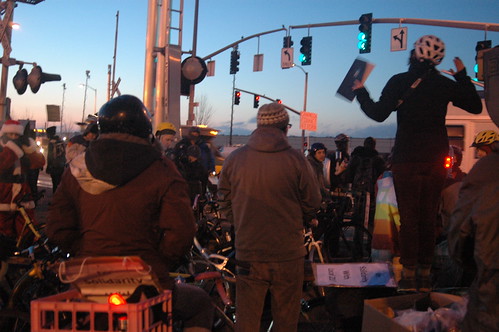 “Bike check!” is how you know the mic check is for the bike swarm.
“Bike check!” is how you know the mic check is for the bike swarm.
One of the reporters for our local daily has recently started using Twitter, mostly in live reporting Occupy events. Two things were immediately clear: First, that he didn’t really get Twitter (he learned fast) and second that he really didn’t get Occupy. One of the first things he tweeted was something along the lines of “it’s kind of creepy the way everyone shouts the speech in response.” Someone explained the concept of “mic check” to him — a human megaphone — and he thanked them, clumsily. I think he may have even forgotten the @ sign before their handle.
At any rate, he seems to have gotten hip to the new ways fast, but it was a reminder that these are new ways. It occurred to me yesterday after getting home from the ports and firing up the computer that Twitter operates like a silent, worldwide mic check, with consciously concise statements being passed around verbatim or nearly so, unfact-checked and often unclicked-through, but with overtones of opinion often added through an emoticon or wiggling fingers.
But of course it’s really the other way around — the Occupation gets much of its grammar and style from social media, particularly Twitter, complete with the ubiquitous hashtags that show up in photo captions and even printed materials, and the text lines set up on the fly where you can get live updates of march locations sent to your phone. It gives it back via social media, too — thanks to the hashtags and a handful of dedicated live tweeters, I was able to follow the events of the bank occupation closely, complete with photos, video, and commentary, from home when I was in bed with the flu. I could even engage with people who were on the streets. It was like living in a nineties dystopian science fiction novel.
This is how culture, language, and technology (and literature?) all emerge together. Oregonian reporters and everyone else involved seem to pick up the terms and styles quickly, but it would still be interesting to see if there’s a culture gap — people who just don’t get it. I’d like to be able to compare Twitter users’ demographics with the people with whom Occupy is and isn’t resonating.